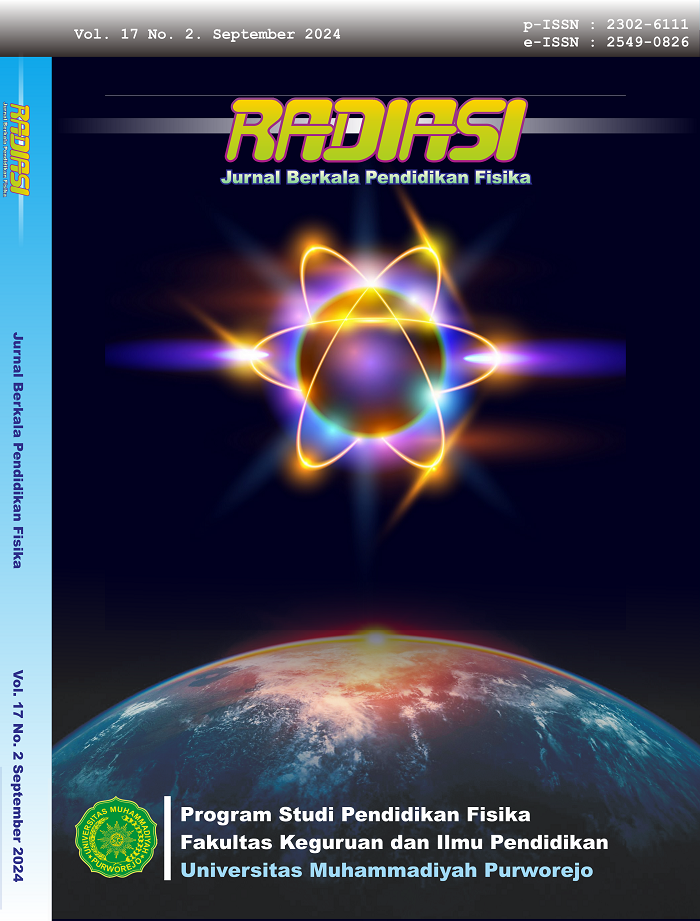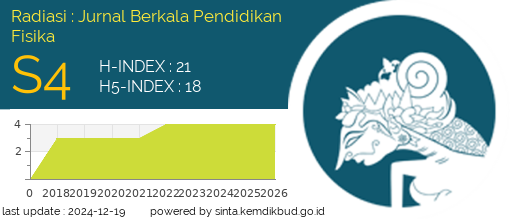Needs Analysis of Implementation of The Mentoring Program for Fundamental Physics 1 Lectures to Support Student Learning Independent
Abstract
This research uses a descriptive method and aims to analyze the need for a mentoring program in the Fundamental Physics I course. The research was conducted on 64 students (32 students had participated in the mentoring program for one semester, and 32 students did not participate in the mentoring program), 2 lecturers, and 4 tutors. Data were obtained from documents of students' final exam scores, interviews, and surveys. The results showed that (1) the final exam scores of students who participated in the mentoring program were better and significantly different from the class that did not participate in the mentoring program, (2) students who participated in the mentoring program gave a positive response to the program, and (3) students who did not participate in the mentoring program felt that they experienced many difficulties in Fundamental Physics I lectures and felt that the mentoring program was necessary.
Downloads
References
M. S. Ali and P. Palloan, “Hasil belajar fisika dasar II ditinjau dari beberapa faktor psikologis (Survei di Program Studi Pendidikan Fisika FMIPA UNM Makassar),” J. eval_. dan Pembelajaran, vol. 2, no. 1, pp. 66–80, 2020.
R. Kustijono, “Implementasi Student Centered Learning Dalam Praktikum Fisika Dasar,” J. Penelit. Fis. dan Apl., vol. 1, no. 2, p. 19, 2011, doi: 10.26740/jpfa.v1n2.p19-32.
F. Leyvraz, “Understanding rigid body motion in arbitrary dimensions,” Eur. J. Phys., vol. 36, no. 3, pp. 1–17, 2015, doi: 10.1088/0143-0807/36/3/035021.
L. Rivaldo, M. R. A. Taqwa, A. Zainuddin, and R. Faizah, “Analysis of students’ difficulties about work and energy,” J. Phys. Conf. Ser., vol. 1567, no. 3, 2020, doi: 10.1088/1742-6596/1567/3/032088.
D. E. Saputri, M. R. A. Taqwa, F. N. Aini, I. Shodiqin, and L. Rivaldo, “Pemahaman konsep mekanika: menentukan arah percepatan pendulum, sulitkah?,” J. Pendidik. Fis. dan Teknol., vol. 5, no. 1, pp. 110–117, 2019, doi: 10.29303/jpft.v5i1.1134.
Y. Tiandho, “Miskonsepsi gaya gesek mahasiswa,” J. Pendidik. Fis. dan Keilmuan, vol. 4, no. 1, pp. 1–9, 2018, doi: 10.2572/jpfk.v4i1.1814.
Y. Chen, P. W. Irving, and E. C. Sayre, “Epistemic game for answer making in learning about hydrostatics,” Phys. Rev. Spec. Top. - Phys. Educ. Res., vol. 9, no. 1, pp. 1–7, 2013, doi: 10.1103/PhysRevSTPER.9.010108.
M. S. Husain, Y. Kendek, and F. Fihrin, “Analisis Tingkat Pemahaman Konsep Fluida Statis dan Penerapannya di Lingkungan Sekitar pada Siswa SMA Negeri 2 Palu,” JPFT (Jurnal Pendidik. Fis. Tadulako Online), vol. 6, no. 1, p. 21, 2018, doi: 10.22487/j25805924.2018.v6.i1.10015.
L. Rivaldo, M. R. A. Taqwa, and T. Taurusi, “Resources Siswa SMA tentang Konsep Gaya Archimedes,” J. Pendidik. Fis. Univ. Muhammadiyah Makassar, vol. 6, no. 3, pp. 251–258, 2018, doi: http://dx.doi.org/10.26618/jpf.v6i3.1438.
D. M. Kurniawati and F. U. Ermawati, “Analysis Students’ Conception Using Four-Tier Diagnostic Test for Dynamic Fluid Concepts,” J. Phys. Conf. Ser., vol. 1491, no. 1, pp. 0–7, 2020, doi: 10.1088/1742-6596/1491/1/012012.
I. N. Pebriana, Sutopo, and M. Diantoro, “Dampak Program Resitasi terhadap Pemahaman Konsep Mahasiswa pada Topik Fluida Dinamis,” J. Pendidik. Teor. Penelit. dan Pengemb., vol. 3, no. 8, pp. 1110–1114, 2018.
C. Schafle and C. Kautz, “Student Reasoning in Fluid Dynamics : Bernoulli ’ s Principle vs Continuity Equation,” 2019. [Online]. Available: https://sefiphysics.br/mirror_PTEE2019/Proceedings/PTEE_2019_artcle-O3.pdf
Z. Azizah, M. R. A. Taqwa, and I. T. Assalam, “Analisis Pemahaman Konsep Fisika Peserta Didik Menggunakan Isntrumen Berbantukan Quizizz,” Edu Sains J. Pendidik. Sains Mat., vol. 8, no. 2, pp. 1–11, 2020, doi: 10.23971/eds.v8i2.1707.
M. R. A. Taqwa, R. Faizah, L. Rivaldo, D. E. Safitri, F. N. Aini, and M. I. Sodiqin, “Students’ Problem-Solving Ability in Temperature and Heat Concepts,” J. Phys. Conf. Ser., vol. 1339, pp. 1–4, 2019, doi: 10.1088/1742-6596/1339/1/012132.
M. R. A. Taqwa, R. Priyadi, and L. Rivaldo, “Pemahaman Konsep Suhu dan Kalor Mahasiswa Calon Guru,” J. Pendidik. Fis., vol. 7, no. 1, pp. 56–67, 2019.
I. Bilgin, E. Şenocak, and M. Sözbilir, “The effects of problem-based learning instruction on university students’ performance of conceptual and quantitative problems in gas concepts,” Eurasia J. Math. Sci. Technol. Educ., vol. 5, no. 2, pp. 153–164, 2009, doi: 10.12973/ejmste/75267.
T. A. Wulandari, T. Prihandono, and M. Maryani, “Analisis Miskonsepsi Siswa pada Materi Suhu dan Kalor di Kelas XI SMA Jember,” FKIP e-PROCEEDING, vol. 3, no. 1, pp. 135–139, 2018.
D. Bukifan and L. Yuliati, “Conceptual understanding of physics within argument-driven inquiry learning for STEM education: Case study,” AIP Conf. Proc., vol. 2330, no. March, 2021, doi: 10.1063/5.0043638.
E. Tatar and M. Oktay, “Students’ Misunderstandings about the Energy Conservation Principle: A General View to Studies in Literature,” Int. J. Environ. Sci. Educ., vol. 2, no. 3, pp. 79–86, 2007.
S. Doğru, “Conceptual Difficulties Encountered By Science Teacher Candidates In Static Electricity,” Eur. J. Sci. Technol., vol. 31, no. 1, pp. 957–967, 2021, doi: 10.31590/ejosat.913290.
A. H. Hashish, I. Seyd-Darwish, and M. N. Tit, “Addressing Some Physical Misconceptions in Electrostatics of Freshman Engineering Students,” Int. J. Innov. Educ. Res., vol. 8, no. 2, pp. 1–7, 2020, doi: 10.31686/ijier.vol8.iss2.2161.
M. N. Khwanda and J. Kriek, “An eval_uation of student’s understanding of DC circuit concepts through students’ written explanations,” J. Phys. Conf. Ser., vol. 1512, no. 1, pp. 0–13, 2020, doi: 10.1088/1742-6596/1512/1/012020.
S. Marcelina and T. J. Hartanto, “Correcting Students’ Understanding about Simple Direct Current (DC) Circuits through Scientific Approach,” J. Penelit. Pengemb. Pendidik. Fis., vol. 7, no. 2, pp. 153–160, 2021, doi: 10.21009/1.07207.
C. Coetzee, M. Rollnick, and E. Gaigher, “Teaching Electromagnetism for the First Time: a Case Study of Pre-service Science Teachers’ Enacted Pedagogical Content Knowledge,” Res. Sci. Educ., vol. 52, no. 1, pp. 357–378, 2022, doi: 10.1007/s11165-020-09948-4.
K. Zuza, M. De Cock, P. Van Kampen, T. Kelly, and J. Guisasola, “Guiding students towards an understanding of the electromotive force concept in electromagnetic phenomena through a teaching-learning sequence,” Phys. Rev. Phys. Educ. Res., vol. 16, no. 2, p. 20110, 2020, doi: 10.1103/PhysRevPhysEducRes.16.020110.
S. Shubha and B. N. Meera, “The Effect of Visual Representation in Developing Conceptual Understanding of Magnetic Force,” J. Form. Des. Learn., vol. 3, no. 1, pp. 82–87, 2019, doi: 10.1007/s41686-019-00031-4.
E. S. Damarwan, M. L. Hakim, A. S. J. Wardhana, and N. Kholis, “Development of Electrical Circuit Learning Media Using Virtual Simulation,” J. Phys. Conf. Ser., vol. 2111, no. 1, pp. 0–9, 2021, doi: 10.1088/1742-6596/2111/1/012042.
S. Sriadhi, R. Restu, and H. Sitompul, “Multimedia simulation model for electrical laboratory learning,” IOP Conf. Ser. Mater. Sci. Eng., vol. 1098, no. 3, p. 032020, 2021, doi: 10.1088/1757-899x/1098/3/032020.
N. Balta and A. Eryılmaz, “Development of Modern Physics Achievement Test: Validity and Reliability Study,” Eur. Educ. Res., vol. 3, no. 1, pp. 29–38, 2020, doi: 10.31757/euer.313.
A. Halim et al., “Student’s misconception and thinking style on modern physics course,” J. Phys. Conf. Ser., vol. 1882, no. 1, 2021, doi: 10.1088/1742-6596/1882/1/012018.
E. Permata, “Pemanfaatan Multimedia Interaktif Dalam Mata Kuliah Fisika Dasar Di Program Studi Pendidikan Vokasional Teknik Elektro Universitas Sultan Ageng Tirtayasa,” Pros. Semin. Nas. Pendidik. Fis., vol. 3, no. 1, p. 256, 2020, [Online]. Available: https://jurnal.untirta.ac.id/index._php/sendikfi/index
S. Kartikawati, W. Sunarno, and S. Suparmi, “Perbedaan Pengaruh Pembelajaran Problem Posing Melalui Tutorial Online dan Tatap Muka terhadap Prestasi Belajar Ditinjau dari Tingkat Aktivitas Belajar Mahasiswa pada Pemahaman Materi Fisika Dasar,” INKUIRI J. Pendidik. IPA, vol. 6, no. 3, p. 163, 2018, doi: 10.20961/inkuiri.v6i3.17870.
W. Kurniawan, F. B. Pujaningsih, A. Alrizal, and N. A. Latifah, “Analisis Kebutuhan Mahasiswa Terhadap Bahan Ajar Sebagai Acuan Untuk Pengembangan Modul Fisika Gelombang Bola Dan Tabung,” EduFisika, vol. 3, no. 01, pp. 17–25, 2018, doi: 10.22437/edufisika.v3i01.5805.
Hermansyah, F. Yahya, S. Fitriyanto, Musahrain, and Nurhairunnisah, “Kemandirian Belajar Calon Guru Fisika Melalui Pembelajaran Berbasis LMS: Schoology,” Indones. J. STEM Educ., vol. 2, no. 1, pp. 34–42, 2020.
R. H. Soesanto, W. Rahayu, and K. Kartono, “Keyakinan Matematis Dan Kemandirian Belajar Mahasiswa Pada Program Studi Pendidikan Matematika [Mathematical Beliefs and the Self-Regulated Learning of Students in a Mathematics Education Study Program],” JOHME J. Holist. Math. Educ., vol. 4, no. 1, p. 31, 2020, doi: 10.19166/johme.v4i1.2637.
Z. Anwar, H. D. Ikawati, and S. Syarifah, “Mentoring Sebagai Suatu Inovasi dalam Peningkatan Kinerja,” J. Educ. Instr., vol. 1, no. 1, pp. 21–28, 2018, doi: 10.31539/joeai.v1i1.209.
A. S. B. Abdullah and M. F. Bin Ismail, “Persepsi Pelajar Terhadap Perlaksanaan Program ‘Peer Mentoring’ Untuk Matapelajaran Matematik Kejuruteraan I Dan Sains Kejuruteraan,” J. STEM Educ., vol. 1, no. 1, pp. 58–66, 2021.
S. Ilmi, N. Hidayat, M. Al-Farisi, I. Tsabitah, and S. El-Walida, “Pendampingan Penguatan Dasar Matematika untuk Meningkatkan Pemahaman Konsep Calon Guru Matematika,” J. Pengabdi. Kpd. Masy. Bersinergi Inov., vol. 1, no. 2, pp. 89–94, 2024.
A. Nshimiyimana and P. T. Cartledge, “Peer-Teaching at the University of Rwanda-a qualitative study based on self-determination theory,” BMC Med. Educ., vol. 20, no. 1, pp. 1–12, 2020, doi: 10.1186/s12909-020-02142-0.
S. Ramaswamy, I. Harris, and U. Tschirner, “Student Peer Teaching: An Innovative Approach to Instruction in Science and Engineering Education,” J. Sci. Educ. Technol., vol. 10, no. 2, pp. 165–171, 2001.
J. Secomb, “A systematic review of peer teaching and learning in clinical education,” J. Clin. Nurs., vol. 17, no. 6, pp. 703–716, 2008, doi: 10.1111/j.1365-2702.2007.01954.x.
M. Stigmar, “Peer-to-peer Teaching in Higher Education: A Critical Literature Review,” Mentor. Tutoring Partnersh. Learn., vol. 24, no. 2, pp. 124–136, 2016, doi: 10.1080/13611267.2016.1178963.
L. R. Chairiyati, “Meningkatkan Motivasi Belajar Bagi Mahasiswa Kurang Berprestasi Melalui Program Mentoring,” Humaniora, vol. 2, no. 1, p. 262, 2011, doi: 10.21512/humaniora.v2i1.3000.
Copyright (c) 2024 Muhammad Reyza Arief Taqwa, Nahadi Nahadi, Siti Sriyati

This work is licensed under a Creative Commons Attribution-NonCommercial 4.0 International License.




